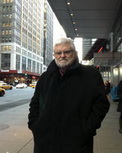 Chris
McDonnell, UK
Chris
McDonnell, UKchristymac733@gmail.com
 Chris
McDonnell, UK
Chris
McDonnell, UK
christymac733@gmail.com
Previous articles by Chris Comments welcome here
April
4, 2018
Once started, it
is hard to stop
Let's start this week with a simple physics lesson. Momentum arises from movement and solving a simple equation, multiplying the mass of an object by its velocity gives the figure we call 'Momentum' P=MV. That's the physics over but it has a lesson worth exploring further.
Big things moving slowly have huge momentum; think of a fully laden oil tanker at sea, it can't stop on the spot. Or think of a small bullet moving very fast; in spite of its size it has huge damaging momentum.
You see, it's all about movement and mass. The momentum of the Church involves something very large indeed; no wonder that once started in a particular direction it takes a long time to change.
That is the task that has faced Francis in the last five years. The Curia in the Vatican has developed a large momentum of its own so it is no wonder that any attempt to alter direction is not a simple matter. It use to be said that the ‘Church lives in centuries’. Maybe it did, but so did much else in society. A man could live his whole life and recognise his final days as very similar to his youth. As T S Eliot wrote in the Four Quartets, ‘In my end is my beginning’.
No more. Societal change is now rapid. Yesterday’s norm is now a matter of history within a very short space of time. There has been greater change in the last sixty years than in the whole of our human experience on this earth. Such change both in respect to its speed and content, has significant consequence, for no sooner has something happened than it is superseded by a further development. This is true across many fields of learning such as medicine, astronomy and data handling. Only in 1984 did a boy in my class describe the delete key as ‘electronic Tippex’. The old replaced by the new and we moved on.
How do we as individuals cope in such circumstances? How does our Church as an institution react to a world order that challenges us in so many ways?
That challenge comes in our daily experience, ranging from the factual scientific discoveries that affect each one of us to the changing social/sexual relationships in multicultural societies. I read on the Net recently that a city of 100 million souls is being suggested in China. The mind shudders at the thought. There are already 47 mega cities on our planet with populations of many millions each. What are the implications for our relationships as we gather in greater numbers in such dense population clusters?
This, albeit on a smaller scale, should be the consideration when, through a lack of priests, there is an amalgamation of parishes and several smaller groupings are artificially redefined in a larger unit. There is a consequence at all sorts of levels, from friendship groups to Eucharistic celebrations. The larger things get the more insignificant the individual feels. Go to Mass in a small village Church and then the following Sunday go to a cathedral. The contrast is self-evident.
With change in the air, we must handle its management with great care and sensitivity. You have only to reflect on the bungled manner in which the Translation issue was foisted upon us. Sensitivity was smothered under the momentum of Rome.
Time and again we read of small gatherings where friendship is shared in the celebration of the Eucharist with recognition of the inter-personal relationship, one with another acknowledging the love of God.
Speaking in Rome in mid-March to a group of young people in preparation for the October synod, Francis told them that they are the ones who can help the church fight "the logic of 'it's always been done this way,'" which he described as "a poison, a sweet poison that tranquilizes the heart and leaves you anesthetized so you can't walk."
The Church and we its members must continue to go out, continue asking what God is calling us to be and continue finding new ways to respond, the pope said. Keeping the momentum of change demands the effort of many, maybe over a long period of time, but it must be persistent and forward-looking. Seeking solutions from the past is no plan for the future, too much has changed and that change cannot be ignored, however inconvenient it may be to accommodate new circumstances.
Stephen Hawking, a scientist of outstanding brilliance died on March 14th, Einstein’s birthday. The momentum of his thought and discovery will be influential in our continued appreciation of the marvels of Creation. Hawking in a BBC interview quoted another great cosmologist, Carl Sagan "Your God is too small for my universe". It is up to us to show otherwise.
END
===